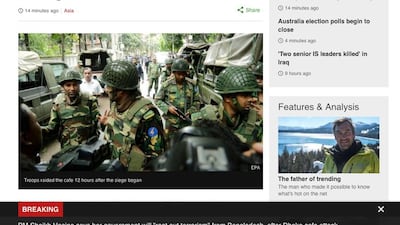In the last gestures of worthless lives, three men committed mass murder at Istanbul airport and the BBC naturally devoted much time and countless words to the atrocity.
Two words absent from the BBC’s coverage, except when attributed to an outsider or perhaps uttered mistakenly by a reporter, were terrorist and terrorism.
Now, the vast majority of people would have no difficulty in applying those terms to each perpetrator and his crime.
But the BBC’s strict policy, while recognising “the existence and the reality of terrorism”, says the T words are “best avoided”.
This, it hastily adds, is “not because we are morally neutral towards terrorism, nor because we have any sympathy for the perpetrators of the inhuman atrocities which all too often we have to report, but because terrorism is a difficult and emotive subject with significant political overtones”.
Any self-respecting media outlet makes choices on style according to philosophy, location, linguistic preference and even an editor’s whim.
And it is instructive to recall that for the Germans occupying France in the Second World War, resistance fighters were terrorists, an insult echoed by the Nazis’ compliant French puppets.
In the context of modern-day attacks at airports, on trains, in planes, at holiday resorts or in the street, the BBC approach seems extraordinarily indulgent.
The UN designates ISIL a terrorist organisation and the extremists themselves are not always squeamish about the term; the goal, after all, is to terrorise populations and governments, forcing harsh responses that alienate Muslim communities and perhaps deliver moderates into their hands.
Can we be sure ISIL carried out the Istanbul attack? There has been no admission of responsibility, though this is routine when it is suspected of exporting terror to Turkey, and there is no immediate linkage between it and the dead attackers.
Until credible admissions are made or connections established, the most that can be said is that the slaughter bore the hallmarks of ISIL massacres in Lebanon, France, Belgium, Tunisia and beyond.
As the group loses ground in its self-declared caliphate, it turns increasingly to supporters outside Syria and Iraq, or travelling from there, to attack foreign civilians.
Soft targets require no great operational skill or courage, unless we charitably take into account the terrorists’ own death wish.
There seems no shortage of young, overwhelmingly male volunteers ready to swallow ISIL’s twisted Islamic narrative, one flatly rejected by respected Muslim scholars, and move from low-life delinquency to terrorism.
Jihadists in conflict zones, often western-born, urge those unwilling or unable to follow to take their war against humanity into the streets of their native countries. Sometimes lines of communication between ISIL commanders and terrorists overseas are strong, but a simple text message may be enough to spur a lone wolf into action.
Here, we encounter a sharp distinction between ISIL and the terrorist campaign waged in the UK by the IRA until a shaky peace was found at the end of the 20th century.
The IRA killed numerous uninvolved civilians but was conscious of the effect this would have on passive Catholic sympathisers.
Such casualties were often caused in error or the IRA simply lied, claiming security forces were given ample warning to clear affected areas.
Today, there is no act of violence so heinous as to be beyond ISIL’s intent. Far from worrying about civilian deaths, the overwhelming desire is to ensure as many as possible, driving a terrible wedge between communities.
This is what makes the BBC’s policy hard to defend. At the very least, we owe it to the families of those butchered by depraved fanatics – whether in Beirut or Paris, Istanbul or Brussels – not to be mealy-mouthed when searching for appropriate words.
Colin Randall is a former executive editor of The National


